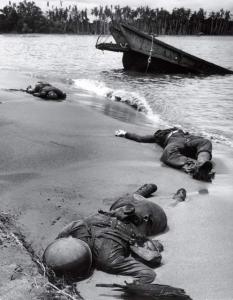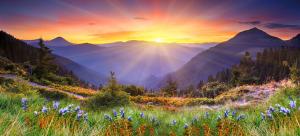Enyumu-ama Pt 3
The smell of cooking was thick in the air; native soup with ‘okogolo’ and ‘opakipaki’ mixed with the firewood smoke. I could see the men, young energetic men with their bare bodies....This is the concluding part of the excerpt of my book En
Enyumu-ama Pt 3
by DavidBokoloI saw a tree standing in the center of the bush with bunches of fruits hanging out. Some guava trees were standing by the river, their fruits yellow, were almost touching the water. I could see lots of coconut trees all around and at the back of the village; their fruits hanging out in bunches.
The driver ran along the side of the boat and jumped down to the ground with the cutlass; which he pinned to the ground and extricated the rope from the bow of the boat and wind it around a stick
“Sir you can come down from the boat, let me just cut out a little space for you to set the table.”
“Oh God, what has happened to my village,” Mom wailed.
I turned to look at her, she has just added 10 more years to her age in that instant. She could not stand up from her seat but merely pointed with her finger, “There, that used to be your grandfather's house. And there, used to be your great- grandmother's house. There was a road there, running across the village,” she paused, took a long breath.
She looked along the water line toward the far end, “See over there, at the end; that’s where the men used to prepare their palm oil. We called there ‘Oguwan’. There were small huts which they used to store the palm nuts until they have enough to prepare the oil.”
I looked toward where she was pointing. All I could see were the trees which branches were bending over the river, the leaves have fallen into the water.
“Hello Ifiemi, can you bring down those chairs and the table,” Dad said, helping the driver to clear away the grass he had cut. “Hello dear, he clapped his hand at Mom, “do come down from the boat. You know that the driver will have to go and come back to pick us up later,”
“Oh Dear! later? How do we stay here until in the evening without a boat?” she looked around the silent bush surrounding the village. “There will be no back door in case of an eventuality.”
“Ah Madam, no one will come here to do anything,” Johnny waved his hands around the village. “No one knows you were coming here.”
“What about the villages we passed on our way here? Don’t you see the way the people came out and were looking at us as we drove by?”
“But that’s a normal thing for people to come out to watch a speed boat to be passing through their community, especially a boat that is going toward Enyumu-ama, a village they knew that no one is residing; and you also need to understand that these are not the best of time,” setting the table as he speaks.
10 minutes later, we were all sitting around the table in the little clearing that Johnny had made; I can hear the faint sound of the engine dying away into the distance and the silence descending on us like an invisible giant monster swooping upon a prey with its claws drawn out.
The sun was slipping through the leaves of the huge trees that were enveloping the little square where the village had once stood. The only sound I could hear, apart from our breathing, are the buzzing and humming noise of the insects and chirping of birds in the bush around us; the smell of fruits and flowers were tantalizingly thick in the air.
I looked behind my seat and saw a guava tree with many ripe fruits swaying gently on their branches from the early morning breeze, whirling within the village.
“Mummy,” I tapped her arm. “Who is the owner of all these fruits in the village?”
She opened her eyes and looked around; a faint smile now appeared on her face as she shook her head.
“You will weep if I tell you what this village used to be. Enyumu-ama was what I’d call the ‘fruit basin’ of this area. We were never hungry as kids running around this village. There were the guava trees in the ‘Mission’ back there,” she pointed to somewhere behind the bush.
We all turned to look. All I could only see where entanglements of trees and grasses.
“There were breadfruit gardens over there beside the Mission. There were guava plants all around the church yard. There were orange and mango trees in the bush with no one to claim ownership. As kids, we were running about, picking and plucking them.”
“Mom, what is breadfruit, and what do they use it for?” Nengi stood up and peered into the undergrowth.
“It is a big round fruit that has a starchy or succulence inside that could be cooked, fried or baked to eat. When it is baked it looks and tastes like bread.” Dad explained.
“We would go to the breadfruit garden, pluck some juicy ones, peel off the skin, and slice them like pancakes then give it to whoever that would be preparing oil to fry it for us; it usually makes a very delicious meal.”
“Ah ah Nengi, look at the way you are staring at Mom. That was in the old days, not now. Nobody would do that for you now free, also, there is no village here for anyone to do that for us here.”
“But Mom, the breadfruit are still in the bush here, aren’t they?” she asked, looking at Mom.
“They could still be in the bush, but without anybody dressing them up, they might not bear any fruit now,” she clasped her hand together and looked at us. “We would sometimes wake up in the early hours of the morning to go to the bush searching for mangoes.”
“Were you not afraid of wild animals in the bush,” I was horrified.
“There was nothing to be afraid of then; our world as kids was a wonderful world, especially, growing up in the countryside. There were no militancy, no kidnapping. Ours was a society where we lived in harmony with nature, eating and nurturing from his providence.”
She looked across the river at the opposite bank. “There used to be coconut tree over the river. Whenever a coconut drops from the tree into the water, every kid available would jump into the water to swim across to pick it; and of course, the fastest swimmer would be the one to pick it.”
“What of if you don’t know how to swim?” I remember what effort Dad had made for us to learn how to swim.
“There would be no kid in the village who will not know how to swim at the age of four,” he answered.
“Look now across the river, there are thorns and thistle; bushes and wildness all around the place,” and her voice trailed off.
I stood and walked up to the edge of the clearing and I saw a track; a foot part, more like, that was currently in use. There were a lot of footprint leading into the bush to the left and right.
“Who has been using this foot part, Dad,” I looked at him as he was whispering something to Mom. “They appear to be fresh as if someone has been using this track. Could they be farmers?”
“No, it is not only farmers that are using this bush-part,” it was Mom who stood up to come and stand at my side, placing her hand on my shoulder. “There are some villages that are still here. You noticed the one we passed just before we got to this place; that is called Agrisaba. They are our closest neighbor or mostly brotherly community that we shared life together. This track here leads to it,” she pointed toward the left-hand side of the track.
“It used to be a very broad road, well cleaned by the two communities at both ends. As kids, we shared a central school, somewhere between the two villages. This track used to be a very busy highway with houses lining both sides; children and their parents busy walking, calling and shouting happily to one another.
“This other side of the road leads to another village called Okoroba. Presently, people from these two villages are still making use of this road visiting one another.”
“Mom, this must have been a very lively village when you were a kid here,” I observed.
She just shook her head and continued. ”There, you see that rusted roof over there? That used to be the town hall, where the village elders gather to deliberate about the affairs of the community. In the front of that, where you see those thick grasses are growing; that used to be the village playing ground.”
“I can’t believe Mom, that all that you are telling me had been reduced to mere grasses and shrubs in less than just twenty years?”
“Twenty years is quite a long time my dear, that’s two years short of your age, and you will understand what you have already known within this period.” She turned to look at the bush in front of the broken down building.
“That playing ground was where we gathered as children to listen to the older people telling us folklores; about the tortoise and the lizard, about Ikagi and Orpain under the moonlight nights. It was such a lovely period. That was also where we organized our traditional wrestling competitions, inviting people from all the villages around here, like Agrisaba, Egenelugo, Biokponga, Iseleogono, Ikensi, and up to even Nembe, to this little village city.
“As children, especially girls like us, we would dress in our Christmas best and would be singing and dancing around. The older women, had dance group to perform ‘Kirisegi’ at the various occasions like Christmas or New Year celebrations.”
“Mom, are you telling us that all these things happened in this ruin of a village?” Nengi had snooped up behind us with Dad, listening to Mom talking about her childhood experience.
“Over there, behind where you are seeing those coconut trees is a small creek, ‘Obiobio.’ It runs the whole length of the back of the village and cut out into this main river at the end of the village up there,” She was running her finger along the line of the river as she was saying.
“That was where the men prepare their palm oil. We always go to that creek to fish for shrimps to put in our hook and for consumption. Every girl must have a net for catching shrimps and hook for fishing. No one buys fish in this village, all the season round. We sometimes go in groups or individual with our canoes.”
“Does that mean everyone in the village must have a canoe?” I was looking along the waterfront to see how they will all tie up their canoes.
“It will be a shame on any adult not to have a canoe. The canoe is like your leg that you have to go about with; you do not have to borrow someone else’s leg to travel with,” Dad explained.
“So what are the boys and the men doing when the women and the girls are going to fishing?” Nengi asked.
“While we go about our fishing, the men would go to the bush to cut palm fruits to prepare their oil. There are so many wild palm trees with nobody claiming ownership of anyone. That was the main source of income; they prepare the oil and sell in the big town like Nembe. The boys will also go with the girls to look for shrimps for fishing.
“Some women wove baskets, mats and thatches to be sold in other villages. Enyumu-ama was a self-sustaining village where no one cries for what to eat.”
I was not hearing much of what she was saying; I could hear her voice droning on beside me. I was, instead, seeing the houses sprawling out all over where I was standing, the foot parts intersecting one another, and children running about from house to house.
I could see the old women, bent over, the burden of age, moving from their kitchen to the water side, canoes tied up in every waterfront. I could see the coconut trees across the river bent over, with their leaves sweeping the water ebbing downstream.
The smell of cooking was thick in the air; native soup with ‘okogolo’ and ‘opakipaki’ mixed with the firewood smoke.
I could see the men, young energetic men with their bare bodies and a short wrapper tied around their waist, hardly reaching to their knees, their biceps bulging out, carrying bunches of palm fruits, moving into their huts.
I could see the young girls carrying nets in one hand and baskets, on the other hand, dressed with only a wrapper tied around their waist and another tied across their breast, wading through the muddy water of Obiobio, laughing and throwing mud at each other.
I heard the church bell from the Mission ringing and the sound of the piano playing a hymn. I could see the young men dancing around the village square, with the drummers beating the wrestling drums. I could see a group of young boys and girls dressed in their Christmas best, holding hands together, going along the road to Agrisaba.
I turned to look at the way to the left-hand side of the road; all I could see was the bush and the ruins of fallen houses. The mud in the houses have all dissolved and the rusted roof overgrown by branches of trees and grasses have caved in, leaving only the hardwood the houses were built with, gaping at me like a broken bridge. It was as if a giant vacuum cleaner descended upon the village and had scooped up everything.
“Mom, where have all the people gone to?” I turned to look at her. “Was there an epidemic? Was there a war? All this ruins in just eighteen years the last time you came here? Where are all the inhabitants?”
I could feel the loss and hopelessness she had felt when we arrived here earlier. The whole place is now only been inhabited by rodents, mosquitoes, and snakes.
She let her hand fell to her side and looked at me. “My dear, I don’t know what happened here. I knew there was neither an epidemic nor war. The old people died of old age and of natural causes. The young men got educated and went to the city to look for a job,” and she became silent.
“Okay folks, let’s go and have breakfast,” Dad broke the silence that had crept up to envelop us. “I’m sure Mom will still tell us about the people that had once lived in this village and what they all did to promote this village to the level it attained. If we are lucky, we might have some boys to help us to pluck fresh coconut for us.” He placed his arm around mom and we all turned to the table.
“When we asked the question where have everyone gone to, we must remember that you are also part of the people of this village,” Dad was saying as he removed the covering cloth of the food. “There were a thousand others like us that have spread all over the world. Go to every city in the country and you will find one family from Enyumu-ama.”
“So, what is the cause of this great dispersion?” Nengi asked as Dad removed the cloth, revealing what we have for breakfast; roasted fish and kpokpogari with coconut.
More from DavidBokolo
The Weightless Weight
by DavidBokolo
Some times we got weight down by thoughts and imagination that do not have weight. the sooner we realize that, we'll be up and going. So says the old man
- Aug, 3 2015
- Lyric
"You Ripped my Love Into Shreds"
by DavidBokolo
Too much love of the cat, they say, kills the moth. Most love relationship got broken as a result of wrongly managed petty frail nerves. Like as I love to say, just musing.
- Sep, 11 2015
- Free Verse
Sing Me Another Love Song My Love
by DavidBokolo
I held on to my Love and refused to let Him go even when I feel him slipping away
- Sep, 15 2015
- Free Verse Lyric
"And Yet The battle Rages On"
by DavidBokolo
There are many unsung Heroes whose heroism is lost in time and space
- Sep, 23 2015
- Prose
I Wish I Could Rewind The Time
by DavidBokolo
I wish I had Known Him many years ago, It,s not too late now though, but I wish I could rewind the time
The One Who Bears My Burden
by DavidBokolo
In sequel to a previous poem, 'Sweet Memories Lingers', Good always sail over our pains if we take time to ponder.
- Aug, 27 2015
- Prose








4 COMMENTS
M.D Khamil
December 2, 2016 - 05:21 Amazing! You could've been a great author!DavidBokolo
December 2, 2016 - 11:41 Is that not what we are all aspiring to be, M.D. I thank you for taking the pain to read through this story. I just did a massive editing to the old post. Thank you for your upvote and encouragement.M.D Khamil
December 3, 2016 - 02:04 Yep we all do, loving all your poems and stories, they're all eyes and mind opening! Same here, I checked my recent and old posts for spelling and grammar errors as well. My grammar is so bad and I'm lacking of vocabs. Need more practices.DavidBokolo
December 5, 2016 - 23:11 Oh, thanks, Khamil. I try using Grammarly and natural readers and other stuff to work with. I have not been able to get a professional editor.